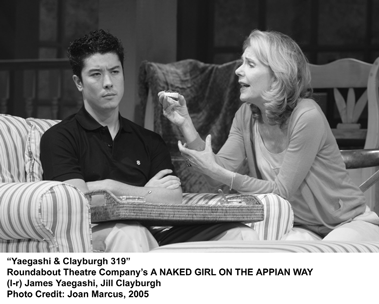Contrived stories on stage offer nothing new
There are two positive things to take away from “A Naked Girl on the Apian Way.” The first is that Jill Clayburgh continues to be the same charming and graceful presence who has always lit up a stage, no matter what she’s been given to do. The second is that Matthew Morrison is one of the most versatile and charismatic young actors working today.
The rest of the experience would be better off avoiding.
Richard Greenberg has written an appallingly superficial and pointless quasi-comedy, which, though newly minted, seems dated in its structure, rhythms, plotting, and stereotypical characters. It brings to mind any number of the forgettable plays that graced Broadway 50 years ago, demanding nothing of its audiences but sufficient sang-froid to laugh at members of the privileged class in awkward situations. Not life-threatening situations, mind you. We can’t have anything that substantive. To appreciate this type of theater, all one needs is a facility for laughing derisively at others when their complacency is stirred by a little surprise.
The intention here seems to be to comfort suburban parents that whatever is going on with their young adult children, it can’t be so bad that it’s not possible to return to one’s life of comfort and affluence, secure in the knowledge that the kids are alright. Along the way, we might as well take snarky swipes at gender confusion, career stasis among the young and educated, and the so-called “boomerang kids,” who return home to the ease of Mom and Dad’s rather than confront the cold, hard world.
The plot twist—more of a bend—that sets all this going is that two of the three adoptive children of Bess (Clayburgh) and Jeffrey Lapin (Richard Thomas), people successful enough to live in a McMansion in the Hamptons, have fallen in love with other and intend to marry. What follows is prolonged hand-wringing by the parents concerned more with how this will appear to their neighbors and social set than with the happiness of the children who do, at least, bicker like believable siblings. Greenberg does not explain that all three are adopted until well into the first act so that when the kids—Morrison, a WASP-y Germanic fellow, Susan Kelegi Watson, a Columbian beauty, and James Yaegashi, a handsome Asian—first appear on the set as siblings, the immediate thought is that Roundabout has employed the race-blind casting practice of The Public Theater.
The family’s social strife is punctuated by the casting of Thomas as a father who is a little dim and tends to misplace his glasses and the appearance of wacky neighbors who walk in unannounced and talk incessantly about themselves, especially an old woman from next door who is a foul-mouthed harridan on the brink of Alzheimer’s with a daughter who is an angry but laughably passé feminist. This is the complete grim picture. At times, Greenberg’s character development and comedy writing rise to the level of “The Beverley Hillbillies,” but not often.
All of this takes place on a set by John Lee Beatty that though beautiful, like the play, makes no organic sense. It’s frustrating to see Roundabout, of all companies, stage a play that is shallow, doing nothing but mimicking a bad sitcom, while there are writers out there, such as Craig Wright, who are bringing honest new voices into the American theater. “The Pavilion,” Wright’s current play at the Rattlestick, is comedic, poetic, and strives to touch the contemporary heart in a way neither as pandering nor coldly formulaic as the garish sloppiness of Greenberg’s work.
If you are a Roundabout subscriber and can’t foist your tickets for “Appian Way” off on some unsuspecting people, you can at least take comfort in the fact that the company is strong. In addition to Clayburgh and Morrison, Thomas brings his native warmth to the role of Jeffrey, making the hackneyed, befuddled Dad at least tolerable. Leslie Ayvazian is bright and exuberant as Elaine, the neighbor who wrote the book on a feminist coming of age circa 1978, and Ann Guilbert throws herself into the role of her vulgar mother, Sadie. She is an engaging presence, though the role is unnecessary and offensive in many ways.
Unfortunately for the actors who work commendably hard, plays like this don’t belong in the contemporary theater. The prevalence of TiVo makes it possible to capture every last minute of shallow television comedy. Save the theater—and these wonderful actors—for something that can elevate the art form, not lower it by making it that most disposable entertainment.
Since the 16th century, Shakespeare has had many things done to his work in pursuit of either art or commerce. It is the risk that comes with work entering the public domain, and while the Bard might have been pleased with some recent efforts, much of what is done in his name seems designed to deny him his eternal rest.
A case in point is “La Tempestad,” a retelling of one of Shakespeare’s most lyrical plays set in the Caribbean island of Vieques as the American military is about to use it for bombing practice.
One certainly understands what playwright Larry Loebell was getting at in reworking Shakespeare’s last play. It is a play about loss, irrevocable change, and surrendering to the inevitable, all of which has happened as Americans have used and decimated other cultures in search of our own ends. Yet Loebell would have been better off writing a fully original play. Superimposing the characters and situations of his imagination on the structure of Shakespeare’s plotting consistently feels forced and artificial.
Loebell is crippled by his own conceit. Shakespeare’s lyricism has been co-opted by ranting about the effects of 9/11, the benefits of gay marriage, and the individual’s relationship to their homeland. Though these are all worthy subjects, Loebell’s writing often sounds like cant, and his situations are contrived to fit the concept, inviting comparisons to Shakespeare—which “La Tempestad” most certainly can’t stand up to.
gaycitynews.com


































